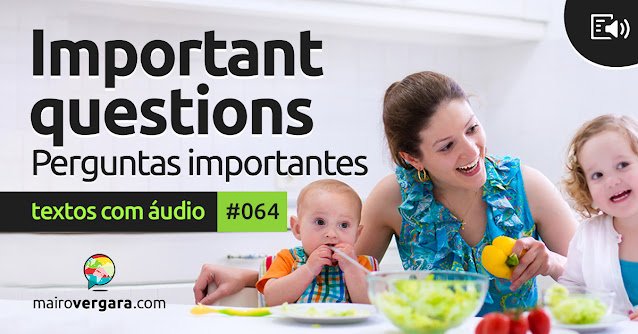IMPORTANT QUESTIONSTexto com áudio
Important questions
Jack, I think we could invite your nieces to spend the summer with us at our beach house. But we need to ask some important questions. Do they eat rice and beans? Do they eat soup? Do they eat lentils? Do they eat chicken? Do they eat pasta? Do they drink juice? Do they wash the dishes? Do they clean their room? Do they wash their own clothes? Do they prepare their own breakfast? Do they like dogs and small kids?
Texto frase por frase
- Jack, I think* we could invite your nieces to spend the summer with us at our beach house. (Jack, eu acho que nós poderíamos convidar as suas sobrinhas para passarem o verão conosco na nossa casa da praia.)
- But we need to ask** some important questions. (Mas nós precisamos fazer algumas perguntas importantes.)
- Do they eat rice and beans? (Elas comem arroz e feijão?)
- Do they eat soup? (Elas comem sopa?)
- Do they eat lentils? (Elas comem lentilha?)
- Do they eat chicken? (Elas comem frango?)
- Do they eat pasta? (Elas comem macarrão?)
- Do they drink juice? (Elas bebem suco?)
- Do they wash the dishes? (Elas lavam a louça?)
- Do they clean their room? (Elas limpam o quarto delas?)
- Do they wash their own clothes? (Elas lavam suas próprias roupas?)
- Do they prepare their own breakfast? (Elas preparam seu próprio café da manhã?)
- Do they like dogs and small kids? (Elas gostam de cachorro e de crianças pequenas?)
Notas
* Muitas vezes, podemos omitir o that (que).
** Ask tem o sentido de perguntar ou pedir; contudo, se fôssemos traduzir a frase para “mas nós precisamos perguntar algumas perguntas importantes”, ficaria meio estranho.
Foco do texto
O foco do texto são perguntas que começam com “do they...?”.
Notas expandidas
Para fazermos perguntas no chamado presente simples (ou seja, quando estamos falando sobre rotinas, hábitos, verdades universais, fatos atuais, desejos e opiniões correntes), precisamos, na maioria das vezes, do verbo DO como auxiliar.
Vamos ver mais alguns exemplos de perguntas com do they (lembrando que they pode ser eles ou elas, e também pode ser usado para falarmos sobre animais, coisas, sentimentos etc.):
|
Your students are so young; do they really know how to write? |
Seus alunos são tão
jovens; eles
realmente sabem escrever? |
|
Your parents are coming this weekend, right? Do they like pasta? |
Seus pais virão neste fim
de semana, certo? Eles gostam de macarrão? |
|
Your dogs are so cute! Do they bite? |
Seus cachorros são tão
fofos! Eles
mordem? |
|
I love those restaurants, but do they accept credit card payments? |
Eu amo esses restaurantes;
mas eles
aceitam pagamentos com cartão de crédito? |





No comments:
Post a Comment